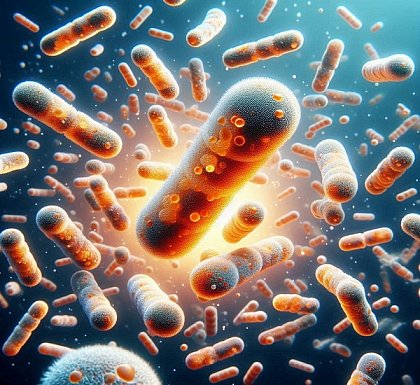Development of novel antibacterial agents
Robin Gehrmann, Jannis von Veh, Lisa Marie Seitz, Peter Werner

Research into new antibiotics is one of the most pressing challenges of modern medicine, as the global rise in antibiotic resistance poses a serious threat to public health. While the discovery of antibiotics such as penicillin in the 20th century made many infectious diseases treatable, the increasing resistance of bacteria to existing drugs has reduced the effectiveness of these life-saving substances. To counteract this crisis, our working group is focusing on developing new antibiotics that are effective against resistant bacteria.
A central approach in antibiotic research is finding new active ingredients from natural sources. Many of the best-known antibiotics, such as penicillin or streptomycin, were originally isolated from bacteria or fungi. This natural diversity still offers untapped resources for the development of new medicines.
We, on the other hand, are experimenting with completely new synthetic molecular structures that either attack bacteria in novel ways or bypass existing resistance mechanisms.
The most important goal is to find new lead compounds that target specific bacterial target structures without damaging the body's own cells. Such targeted therapies can reduce side effects and increase the effectiveness of treatment.
Research into new antibiotics requires interdisciplinary collaboration between microbiologists, chemists, pharmacists and clinics to discover, test and bring potential drugs to market. It is a long-term and complex task, but the success of this effort is critical to combat the increasing threat of resistant bacteria and protect public health.
Literature: F. Lentz, et al., Molecules 23, 825 (2018);
R. Gehrmann, Molecules 27, 61 (2022);
M. Seethaler et al., Pharmaceuticals 15, 1138 (2022);
L. Seitz et al., Med. Chem. 20, 30-39 (2024).
Project approvals
Approval of the DFG project:
Using novel active ingredients to develop new approaches to receptor-mediated tumor resistance (HI 687/10-1) as a joint project of the Medical Chemistry Working Group at the Institute of Pharmacy at the MLU (Prof. Dr. Wolfgang Sippl) and the Department of Clinical Pharmacy at the Institute of Pharmacy at the University of Greifswald (Prof. Dr. Christoph Ritter)
Approval of the BMBF project:
Validation of pyruvate kinase as a new metabolic target for combating antibiotic-resistant bacteria - PyrBac - Sub-project: Development and physicochemical characterization of novel pyruvate kinase inhibitors as a joint project with the Institute for Molecular Infection Biology at the Ludwig Maximilian University of Würzburg (PD Dr. Knut Ohlsen) and the Department of Cellular Biochemistry and Metabolomics at the Institute of Biochemistry at the University of Greifswald (Prof. Dr. Michael Lalk)




